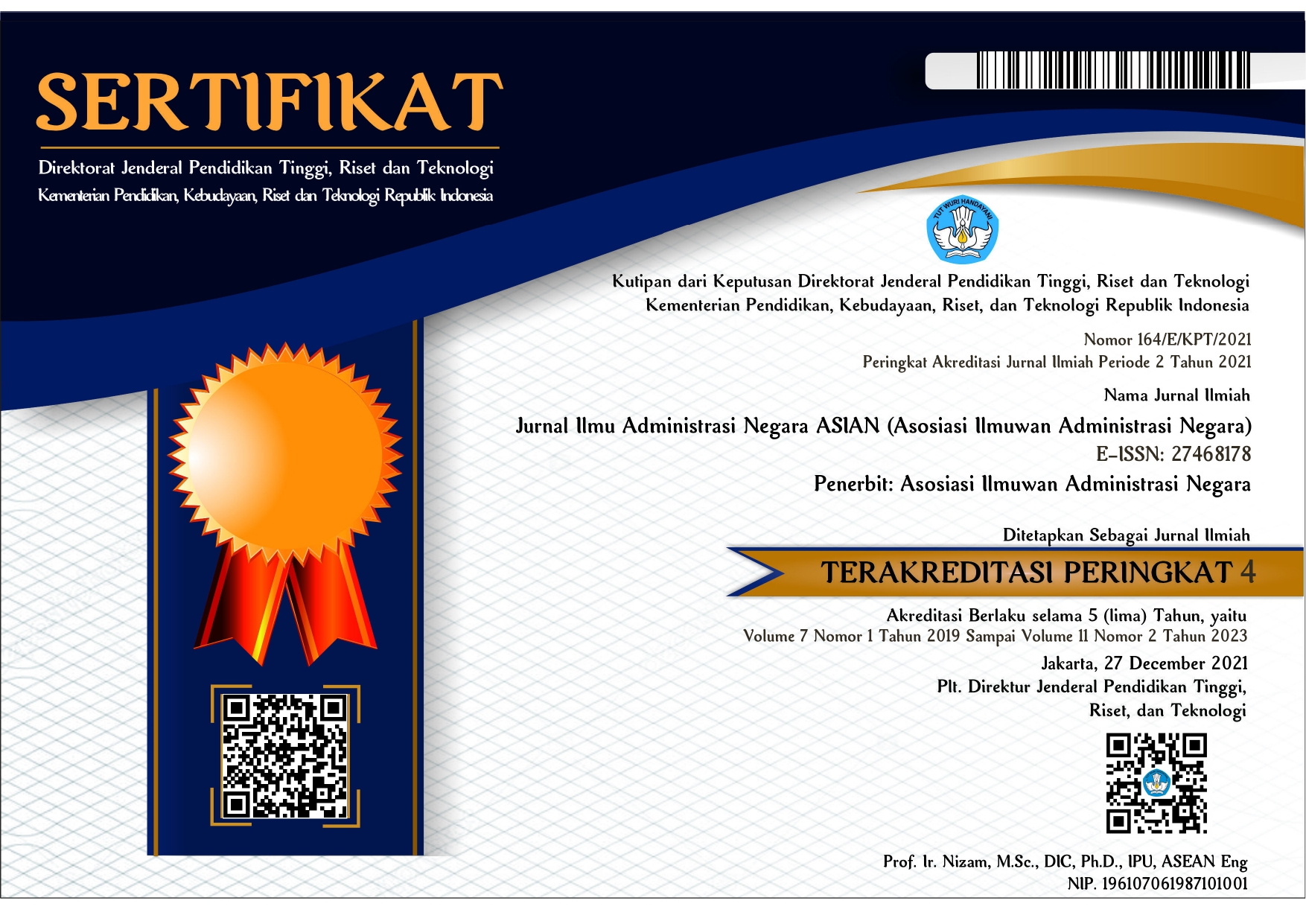Percepatan Reformasi Birokrasi Melalui Budaya Keterbukaan Informasi di Daerah Istimewa Yogyakarta
 Abstract views: 1138
,
Abstract views: 1138
,
 PDF downloads: 1340
PDF downloads: 1340
Abstract
Public services in Indonesia have many complaints from the public due to unclear procedures, limited access to information, and inadequate infrastructure. The enactment of the Law on Public Information Disclosure gives the public the right to supervise governance and improve the quality of information management and services within the Public Agency. The DIY Regional Government PPID which has been established since 2013 has not shown good performance. The purpose of this study was to analyze the performance of PPIDs and the factors that influence the acceleration of bureaucratic reform to create a culture of information openness. Performance evaluation is measured based on aspects of productivity, service quality, responsiveness, responsibility, and accountability. Meanwhile, the influencing factors are seen from personal / individual, leadership, team, system, and contextual (situational) factors. This research method uses a qualitative descriptive approach. The data collection technique is done through interviews, observation, and documentation study. An important finding from the performance evaluation results is that PPID productivity and accountability are still low. Meanwhile, factors that hinder performance are limited understanding of PLID, lack of intensity of communication between the Regional Head and Assistant PPIDs and the absence of budget support for PPID. Strategies that need to be carried out include improving the quality of PPID service performance by compiling a community satisfaction index, updating the classification of information regularly, monitoring and evaluation by giving awards and punishment, improving personality and utilizing various social media.
Downloads
References
Deni Triyanto. 2017. “nalisis Kinerja Organisasi Dalam Mewujudkan Pelayanan Prima Kepada Masyarakat (Studi Pada Kantor Badan Pelayanan Perizinan Terpadu Kota Semarang).” Mimbar Jurnal Penelitian Sosial dan Politik 6(4): 6–13.
Dewi Amanatun Suryani. 2017. “Mewujudkan Good Governance Badan Publik Negara Di Daerah Istimewa Yogyakarta Melalui Keterbukaan Informasi Publik.” Spirit Publik Volume 12, Nomor 1 Halaman 35-44 12(April): 35–44.
Grescentia. T, V. 2019. “Keterbukaan Informasi Dalam Pelayanan Perizinan Di Dinas Perizinan Dan Penanaman Modal Daerah Istimewa Yogyakarta.” JSPG: Journal of Social Politics and Governance 1(2): 66–80.
Helmi, Rahmadhona Fitri. 2019. “Penyelesaian Sengketa Informasi Publik di Komisi Informasi Provinsi Sumatera Barat.” JESS (Journal of Education on Social Science).
Henovanto, Khansa, Muhammad Mansur, Siti Ghina, and Zahra Karyna Putri. 2020. “Analisis Pencapaian PPID Provinsi DKI Jakarta Dalam Meraih Penghargaan Keterbukaan Informasi Publik Tahun 2019.” Jurnal Noken: Ilmu-Ilmu Sosial 5(1): 1–14.
Kádárová, Jaroslava, Michaela Durkáčová, and Lenka Kalafusová. 2014. “Innovative Approaches to the Modification of BSC Model.” Procedia - Social and Behavioral Sciences.
Kenda, Ndoheba. 2015. “Implementasi Pejabat Pengelola Informasi Dan Doku- Implementation of Information and Documantation Of-.” Jurnal Penelitian Komunikasi dan Opini Publik 19(3): 165–86.
Marietha, Sri Rezeki. 2017. “Keterbukaan Informasi Publik Pemerintah Provinsi Kalimantan Timur.” (April): 68–77.
Noor, Muhammad Usman. 2019. “Inisiasi Masyarakat Informasi Di Indonesia Melalui Implementasi Keterbukaan Informasi Publik : Satu Dekade Undang-Undang Keterbukaan Informasi Publik.” Khizanah al-Hikmah : Jurnal Ilmu Perpustakaan, Informasi, dan Kearsipan 7(1): 11.
Nurdiansyah, Edwin. 2016. “Keterbukaan Informasi Publik Sebagai Upaya Mewujudkan Transparansi Bagi Masyarakat.” Bhineka Tunggal Ika 3(2): 147–51.
Nursam, Nasrullah. 2017. “Manajemen Kinerja.” Kelola: Journal of Islamic Education Management.
Paris, Yusran. 2014. “Pengaruh Pelayanan Bidang Penerbitan Sertifikat Tanah Terhadap Kepuasan Masyarakat Pada Kantor Badan Pertanahan Nasional Kota Makassar.” Jurnal Ilmiah Ilmu Administrasi Publik 4(1): 65–83.
Penanaman, Perizinan, and Verena Grescentia T. 2019. “2685-8096 || p-Issn 2686-027.” 1(2): 66–80.
Retnowati, E. 2012. “Keterbukaan Informasi Publik.” : 54–61.
Sjoraida, Diah Fatma. 2015. “Implementasi Kebijakan Keterbukaan Informasi Publik Pada Pemerintah Provinsi Jawa Barat.” Sosiohumaniora 17(3): 204.
Susila Wibawa, Kadek Cahya. 2019. “Urgensi Keterbukaan Informasi Dalam Pelayanan Publik Sebagai Upaya Mewujudkan Tata Kelola Pemerintahan Yang Baik.” Administrative Law and Governance Journal 2(2): 218–34.
Tullah, Rahmat, and Muhammad Iqbal Hanafri. 2014. “Evaluasi Penerapan Sistem Informasi Pada Politeknik LP3I Jakarta Dengan Metode Pieces.” Jurnal Sisfotek Global.
Tunggul, Adi Mora, Rizal Isnanto, and Oky Dwi Nurhayati. 2016. “Evaluasi Kinerja Organisasi Publik Dengan Menggunakan Pendekatan Balanced Scorecard Dan Analytic Network Process.” Jurnal Sistem Informasi Bisnis 6(2): 124.
Wanprala, Coni, Isnaini Muallidin, and Dewi Sekar Kencono. 2020. “Kualitas Layanan Keterbukaan Informasi Publik Berbasis Webportal Pada Pejabat Pengelola Informasi dan Dokumentasi (PPID) Kabupaten Sleman Tahun 2019.” Kybernan: Jurnal Studi Kepemerintahan.
Wardana, Data, and Geovani Meiwanda. 2017. “Reformasi Birokrasi Menuju Indonesia Baru, Bersih Dan Bermartabat.” Pemerintahan, Politik dan Birokrasi 3(April): 334.
West, Damian, and Deborah Blackman. 2015. “Performance Management in the Public Sector.” Australian Journal of Public Administration.
Zulaikha, Zulaikha, and Agni Istighfar Paribrata. 2017. “Implementasi Kebijakan Keterbukaan Informasi Publik Di Jawa Timur Tahun 2016.” Jurnal Studi Komunikasi (Indonesian Journal of Communications Studies).
Copyright (c) 2021 Jurnal Ilmu Administrasi Negara ASIAN (Asosiasi Ilmuwan Administrasi Negara)

This work is licensed under a Creative Commons Attribution-ShareAlike 4.0 International License.
Authors who publish with this journal agree to the following terms:
1. Copyright on any article is retained by the author(s).
2. The author grants the journal, right of first publication with the work simultaneously licensed under a Creative Commons Attribution License that allows others to share the work with an acknowledgment of the work’s authorship and initial publication in this journal.
3. Authors are able to enter into separate, additional contractual arrangements for the non-exclusive distribution of the journal’s published version of the work (e.g., post it to an institutional repository or publish it in a book), with an acknowledgment of its initial publication in this journal.
4. Authors are permitted and encouraged to post their work online (e.g., in institutional repositories or on their website) prior to and during the submission process, as it can lead to productive exchanges, as well as earlier and greater citation of published work.
5. The article and any associated published material is distributed under the Creative Commons Attribution-ShareAlike 4.0 International License








